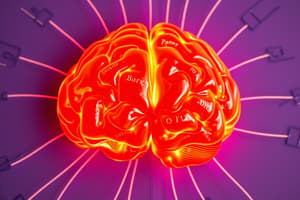Podcast
Questions and Answers
Which memory strategy becomes more common in middle childhood and is highly effective because each category serves as a retrieval cue for the items within the category?
Which memory strategy becomes more common in middle childhood and is highly effective because each category serves as a retrieval cue for the items within the category?
- Association
- Organisation (correct)
- Transformation
- Elaboration
What is one example of elaboration as a memory strategy mentioned in the text?
What is one example of elaboration as a memory strategy mentioned in the text?
- Repeating items multiple times
- Creating an acronym (correct)
- Grouping items into categories
- Arranging items in alphabetical order
At what age are children more likely to group items into categories when given a list of items to remember?
At what age are children more likely to group items into categories when given a list of items to remember?
- Older adulthood
- Adolescence
- Middle childhood (correct)
- Early childhood
During middle childhood, the capacity of working memory increases. What is the length of the sequence recalled on memory tests for the typical 7-year-old?
During middle childhood, the capacity of working memory increases. What is the length of the sequence recalled on memory tests for the typical 7-year-old?
Which memory strategy involves repeating the information over and over?
Which memory strategy involves repeating the information over and over?
In a study by John Flavell and his colleagues, what age group showed the use of rehearsal as a memory strategy?
In a study by John Flavell and his colleagues, what age group showed the use of rehearsal as a memory strategy?
Which memory strategy emerges as a memory strategy in middle childhood, as shown in a study by John Flavell and his colleagues?
Which memory strategy emerges as a memory strategy in middle childhood, as shown in a study by John Flavell and his colleagues?
What is the capacity of working memory for the typical 12-year-old on memory tests for sequences of numbers?
What is the capacity of working memory for the typical 12-year-old on memory tests for sequences of numbers?
Which memory strategy involves placing things into meaningful categories?
Which memory strategy involves placing things into meaningful categories?
Which memory strategy becomes more common in middle childhood and involves transforming bits of information in a way that connects them and makes them easier to remember?
Which memory strategy becomes more common in middle childhood and involves transforming bits of information in a way that connects them and makes them easier to remember?
What is one example of organisation as a memory strategy mentioned in the text?
What is one example of organisation as a memory strategy mentioned in the text?
At what age does the use of elaboration as a memory strategy become more common?
At what age does the use of elaboration as a memory strategy become more common?
Which of the following is NOT a factor contributing to memory improvement in middle childhood?
Which of the following is NOT a factor contributing to memory improvement in middle childhood?
At what age do most children have some grasp of metamemory?
At what age do most children have some grasp of metamemory?
What is one example of a metamemory understanding mentioned in the text?
What is one example of a metamemory understanding mentioned in the text?
Which age group tends to have inflated appraisals of their own memory abilities during early and middle childhood?
Which age group tends to have inflated appraisals of their own memory abilities during early and middle childhood?
What is metamemory?
What is metamemory?
At what age do children in middle childhood develop more accurate assessments of their memory abilities?
At what age do children in middle childhood develop more accurate assessments of their memory abilities?
Which memory strategy involves adding additional details or associations to information to enhance memory?
Which memory strategy involves adding additional details or associations to information to enhance memory?
What is the purpose of rehearsal as a memory strategy?
What is the purpose of rehearsal as a memory strategy?
Which memory strategy involves structuring and grouping information to make it more meaningful and easier to remember?
Which memory strategy involves structuring and grouping information to make it more meaningful and easier to remember?
Which of the following best describes meta-memory?
Which of the following best describes meta-memory?
What is the purpose of using meta-memory strategies?
What is the purpose of using meta-memory strategies?
Which memory strategy becomes more common in middle childhood and involves transforming bits of information to make them easier to remember?
Which memory strategy becomes more common in middle childhood and involves transforming bits of information to make them easier to remember?
Which memory strategy involves the repetition of information to maintain it in memory?
Which memory strategy involves the repetition of information to maintain it in memory?
Which memory strategy involves the structuring and grouping of information to make it more meaningful and easier to remember?
Which memory strategy involves the structuring and grouping of information to make it more meaningful and easier to remember?
What does meta-memory refer to?
What does meta-memory refer to?
Which of the following best describes meta-memory?
Which of the following best describes meta-memory?
What is the purpose of using meta-memory strategies?
What is the purpose of using meta-memory strategies?
Which memory strategy involves structuring and grouping information to make it more meaningful and easier to remember?
Which memory strategy involves structuring and grouping information to make it more meaningful and easier to remember?
Which memory strategy involves adding additional details or associations to information to enhance memory?
Which memory strategy involves adding additional details or associations to information to enhance memory?
What is the purpose of using mnemonic devices as a memory strategy?
What is the purpose of using mnemonic devices as a memory strategy?
Which memory strategy involves the repetition of information to maintain it in memory?
Which memory strategy involves the repetition of information to maintain it in memory?
Which of the following best describes meta-memory?
Which of the following best describes meta-memory?
Which memory strategy involves structuring and grouping information to make it more meaningful and easier to remember?
Which memory strategy involves structuring and grouping information to make it more meaningful and easier to remember?
What is one example of a metamemory understanding mentioned in the text?
What is one example of a metamemory understanding mentioned in the text?
Flashcards are hidden until you start studying
Study Notes
Memory Strategies in Middle Childhood
- Categorization is a memory strategy that becomes more common in middle childhood, and it's highly effective because each category serves as a retrieval cue for the items within the category.
- Elaboration, an example of which is adding a sentence to a word to make it more memorable, emerges as a memory strategy in middle childhood.
- Children are more likely to group items into categories when given a list of items to remember around 7-10 years old.
- The capacity of working memory increases during middle childhood.
- The typical 7-year-old can recall a sequence of 5-6 items on memory tests.
- Rehearsal, a memory strategy that involves repeating the information over and over, is used by children around 7-10 years old.
- Organisation, which involves placing things into meaningful categories, is a memory strategy that emerges in middle childhood.
- Elaboration, which involves transforming bits of information in a way that connects them and makes them easier to remember, becomes more common in middle childhood.
- An example of organisation is grouping items into categories, such as grouping toys by type.
- The use of elaboration as a memory strategy becomes more common around 10-12 years old.
- Lack of sleep is not a factor contributing to memory improvement in middle childhood.
- Most children have some grasp of metamemory, or the ability to think about and reflect on their own memory, around 5-7 years old.
- An example of a metamemory understanding is knowing that one's memory can be improved with practice.
- Children during early and middle childhood tend to have inflated appraisals of their own memory abilities.
- Metamemory refers to the ability to think about and reflect on one's own memory.
- Children in middle childhood develop more accurate assessments of their memory abilities around 10-12 years old.
- Elaboration involves adding additional details or associations to information to enhance memory.
- The purpose of rehearsal is to maintain information in memory.
- Organisation involves structuring and grouping information to make it more meaningful and easier to remember.
- Meta-memory refers to the ability to think about and reflect on one's own memory, and the purpose of using meta-memory strategies is to improve memory abilities.
- Elaboration involves transforming bits of information to make them easier to remember, and it becomes more common in middle childhood.
- Rehearsal involves the repetition of information to maintain it in memory.
- Organisation involves structuring and grouping information to make it more meaningful and easier to remember.
- The purpose of using mnemonic devices, such as rehearsal and organisation, is to improve memory abilities.
- The purpose of using meta-memory strategies is to improve memory abilities.
Studying That Suits You
Use AI to generate personalized quizzes and flashcards to suit your learning preferences.




